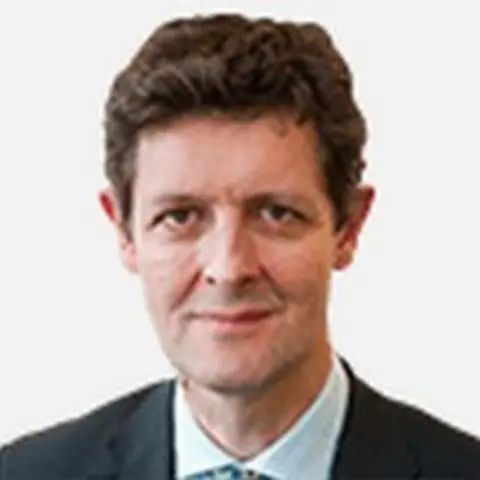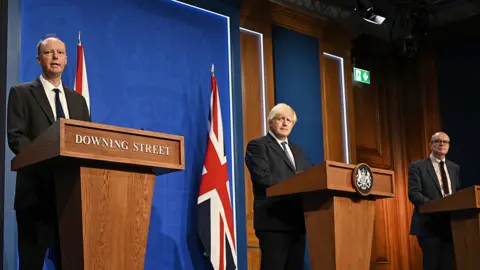Covid: Farewell Downing St briefings (for now, at least)

 Getty Images
Getty Images"Next slide please…" It became an everyday phrase. The official experts - Sir Chris Whitty, the UK government chief medical adviser, and Sir Patrick Vallance, chief scientific adviser - became household names because of the Downing Street media briefings.
Deducing their thought processes was vital to an understanding of the evolution of Covid. So what did we learn?
By 12 March 2020 some European countries were beginning to lock down, but the view in Downing Street was that this was not necessary. Chris Whitty - his knighthood came later - said that imposing restrictions too early could prove counterproductive.
At the same briefing Sir Patrick Vallance explained, with the help of slides, what the strategy was at that stage. He suggested that the aim was to push the peak of the virus into the summer when the elderly would be less vulnerable. And he hinted at the idea of herd immunity - that is, allowing the virus to spread through the population to build up resistance to future infections.
The concept of herd immunity was to become highly controversial. Sir Patrick was later criticised for raising it, even though some other scientists may have agreed with him. The comments on that day by both official advisers were outdated and overtaken by events within days.
The predictions of a dramatically higher death toll and the NHS being overwhelmed spooked ministers and officials. Lockdown followed, with a new drive to suppress the virus. First ministers in Scotland, Wales and Northern Ireland, flanked by their chief medical officers, began their own televised briefings.
The first wave peaked and subsided and there was a tentative opening up of society in the summer of 2020. But then came ominous signs of a new surge. By mid-September Sage, the expert committee, had discussed the idea of a mini-lockdown, known as a circuit-breaker.
This was rejected by ministers but by Halloween the government had realised there was a need for further intervention. And at the media briefing that Saturday evening the first open indication of a rift between scientists and politicians was clear. Sir Patrick made no secret of his view that action could have happened sooner.
The November lockdown came and went. Ministers later argued that a circuit-breaker in September would not have made any difference. Hopes rose that some sort of a Christmas with family gatherings might be permitted. There was confirmation of a temporary easing of restrictions but there were warnings of the rapid spread of a Covid variant, since named Alpha.
Then came a dramatic U-turn on the Saturday before Christmas, with a large swathe of the South East of England barred from social gatherings. The BBC's Laura Kuenssberg asked the chief medical adviser for some updated guidance.
The difference in tone between Sir Chris Whitty and the prime minister was obvious. It was perhaps the first moment when the chief medical adviser's plain-speaking message to the public resonated more clearly than the political statements.
The second wave hit hard in January 2021. Hospitals were once again under extreme pressure. The debate on opening up in England resumed in the spring and the government decided to lift restrictions in July. Some scientists and medical experts said this was too soon but Sir Chris supported the move, arguing it was best to go ahead in the summer.
But by December a new variant, Omicron, had reared its head. There were renewed predictions of a dramatic surge in hospital admissions at the busiest time for the NHS, in the depths of winter. Ministers opted not to impose new restrictions in England, unlike their counterparts in the UK's other nations.
By now the briefings were in the bright new press room, refurbished at a cost of £2.6m. But Sir Chris was gloomy and gave his own advice to the public to reduce their social contacts.
His grim analysis of the possible Omicron toll proved to be over-pessimistic, though he was only reflecting the forecasts of the Sage expert committee. But his suggestion that people should limit social gatherings was highly significant. Ministers had badly wanted to avoid further restrictions or any downbeat messaging which might dampen people's festive plans. But the chief medical adviser did it his own way.
Pubs, restaurants and shops appeared to be a lot quieter. People seemed immediately to follow his advice - it demonstrated the power of the presser.
On 21 February 2022 it was announced that remaining legal restrictions in England would be lifted. There were accusations that this was a political decision. What did Whitty and Vallance think? Would they appear at the Downing Street briefing alongside the prime minister?
In the end, they were there, suggesting they had no principled objection to the new policy. But there were hints about the dangers of a new variant appearing. Sir Patrick, in his usual pithy way, sounded a cautionary note.
So farewell, then, the Downing Street presser… for now. But don't rule out another appearance of the two leading public officials if there is a Covid resurgence. Hindsight tells us that in the early stages their analysis was off beam. Along with ministers, they were slow to realise lockdown was the only option available.
At times they appeared diffident alongside their political masters. But their confidence grew, as did their willingness to strike their own notes on the media conference stage. They kept their cool even under what must have been extraordinary pressure and the weight of responsibility.
There are bigger questions about their role in the government machine and whether more independent scrutiny of Sage and data modelling is necessary. But these may have to wait till the public inquiry.
